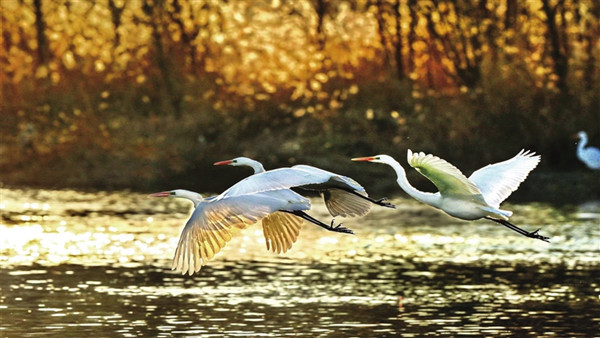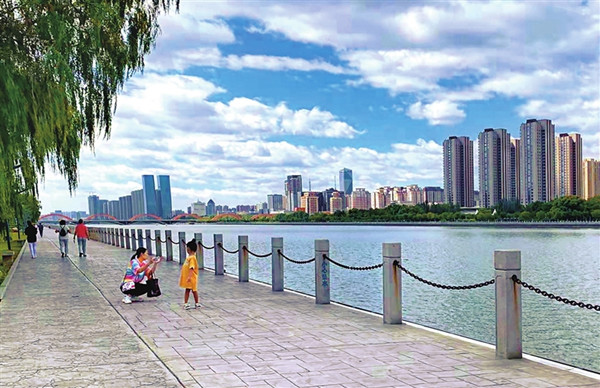
Elegant egrets take wing over the Fenhe River in Taiyuan. With its remarkably improved environment, some 165 species of birds are recorded to have migrated or lived in the Fenhe River in Taiyuan in recent years. [Photo/Taiyuan Evening News]
Taiyuan, capital of North China's Shanxi province, has been transforming the urban section of the Fenhe River into a lush green landscape, cultural and leisure corridor by implementing the Fenhe River ecological rehabilitation project since 1998.
After four phases of restorative treatment undertaken over 20 years, the city has formed a 43-kilometer green ecological corridor. Since beginning water storage in 2000, the Taiyuan urban section of the Fenhe River has been replenishing water from the Fenhe Reservoir every year.
Currently, the total area of the Taiyuan urban section of the Fenhe River basin is 20 square kilometers – with the green area occupying 9.5 sq km and the water surface covering 10.5 sq km. Its total water storage capacity is estimated at about 30 million cubic meters, equivalent to a medium-sized reservoir in the center of the city.
This is said to have significantly improved the local environment. The highest temperature in summer in the Fenhe River scenic spot is about 4 degrees lower than that of other areas of Taiyuan, while the relative humidity has been increased by 10-20 percent.

People promenade by the Fenhe River in Taiyuan. [Photo/Taiyuan Evening News]
In 2018, Taiyuan completed a comprehensive treatment project focusing on improving the water quality of the Fenhe River and its nine tributaries in the city – to eliminate the black and malodorous water bodies in the rivers in the built-up areas of the city.
By June 2020, the water quality at 13 national-level inspection centers along the Fenhe River had risen to Grade V – the lowest level on the national five-tier water quality system – and no more water below this grade is now entering the Yellow River from the Fenhe River.
Taiyuan has also been integrating its urban greening, cultural landscape and historical heritage with environmental governance in the Fenhe River ecological rehabilitation project.
There are 24 bridges of various shapes spanning the Fenhe River, connecting the east and west parts of the city. A 75-km-long riverside bicycle path has been built along the waterway. More than 230 species of trees and flowers are dotted about the scenic area. Over 100 different landscapes established in the Fenhe River scenic area – themed on Shanxi's culture – are widely said to have created a strong cultural atmosphere in the city.
Due to its people-oriented concept and top-flight attainments, Taiyuan successively won the China Habitat Environment Prize and the Dubai International Award for Best Practices to Improve the Living Environment in 2002 with the ecological rehabilitation project.
